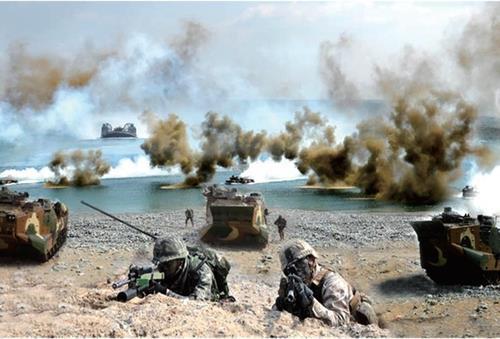 |
Marines from South Korea and the US take part in amphibious landing drills in April 2020. (Ministry of National Defense) |
South Korea should not suspend military exercises with the US to rebuild ties with North Korea because Pyongyang is not interested in peace efforts like Seoul, experts said Tuesday.
On Sunday, Kim Yo-jong, the sister of North Korean leader Kim Jong-un, warned Seoul against holding the drills, which Pyongyang routinely denounces as rehearsals for war. The South and US annually stage drills mainly in spring and summer to bolster readiness against the North.
A last-minute debate over whether to greenlight the August drills this year is underway as the South Korean government looks to pursue diplomacy with North Korea over recently reconnected hotlines that Pyongyang had asked to reopen. The North cut them off last year in protest of the South’s policy.
“We need to see her move for what it is: a bullying tactic meant to pressure the US-ROK alliance to once again delay a critical military exercise,” said Harry J. Kazianis, senior director of Korean studies at the Washington-based Center for the National Interest. The Republic of Korea is the South’s formal name.
Kazianis said North Korea has nothing to fear because the drills are computer-based war games rather than all-out field exercises, which have been suspended since 2019 after former US President Donald Trump halted them to save costs and facilitate North Korea’s denuclearization.
“The US and ROK have already given up most of their major field training exercises done each winter and summer and gotten almost nothing from North Korea in exchange,” said Bruce Bennett, a senior defense analyst at the US-based policy think tank Rand Corp.
North Korea has yet to solidify its commitment to abandon its nuclear arsenal as it promised in a series of inter-Korean summits that took off in April 2018, when the two neighbors agreed to make the Korean Peninsula nuclear-free.
Instead, Pyongyang severed all communication with Seoul and demolished an inter-Korean liaison office last year to protest Seoul’s handling of anti-North Korea activists who launched propaganda leaflets over the inter-Korean border. The South then introduced legislation that made the activity a crime.
“The Kim family regime’s political warfare strategy relies heavily on its blackmail diplomacy -- the use of increased tension, threats and provocations to gain political and economic concessions,” said David Maxwell, a senior fellow at the Foundation for Defense of Democracies in Washington.
Kim Yo-jong’s warning on the drills, which came just a week after North Korea reopened the communication lines it had left unattended despite South Korea’s yearlong outreach to restore them, demonstrates a unique North Korean strategy, according to Maxwell.
“It conducts provocations for specific objectives. It does not represent a policy failure on our part,” Maxwell said, noting South Korea and the US should not be held responsible for the pattern of North Korean tactics.
Experts said Seoul and Washington should have a quid pro quo deal with Pyongyang if the drills were to get pushed back or skipped altogether.
“The bottom line is Washington and Seoul should get something in return for such a concession. We can’t come to heel every time Kim Yo-jong asks -- that would be a mistake,” Kazianis said.
By Choi Si-young (
siyoungchoi@heraldcorp.com)






![[Exclusive] Hyundai Mobis eyes closer ties with BYD](http://res.heraldm.com/phpwas/restmb_idxmake.php?idx=644&simg=/content/image/2024/11/25/20241125050044_0.jpg)
![[Herald Review] 'Gangnam B-Side' combines social realism with masterful suspense, performance](http://res.heraldm.com/phpwas/restmb_idxmake.php?idx=644&simg=/content/image/2024/11/25/20241125050072_0.jpg)
